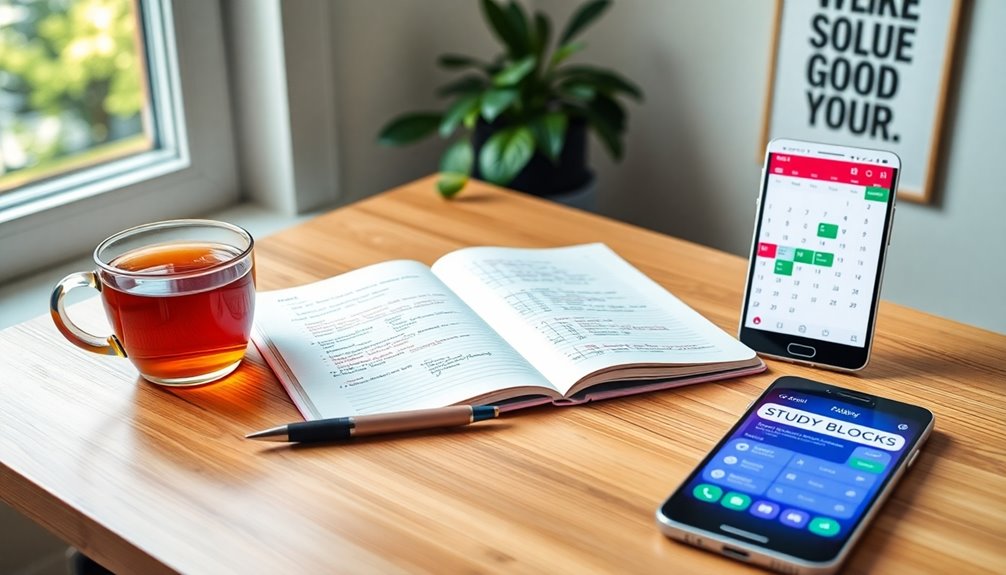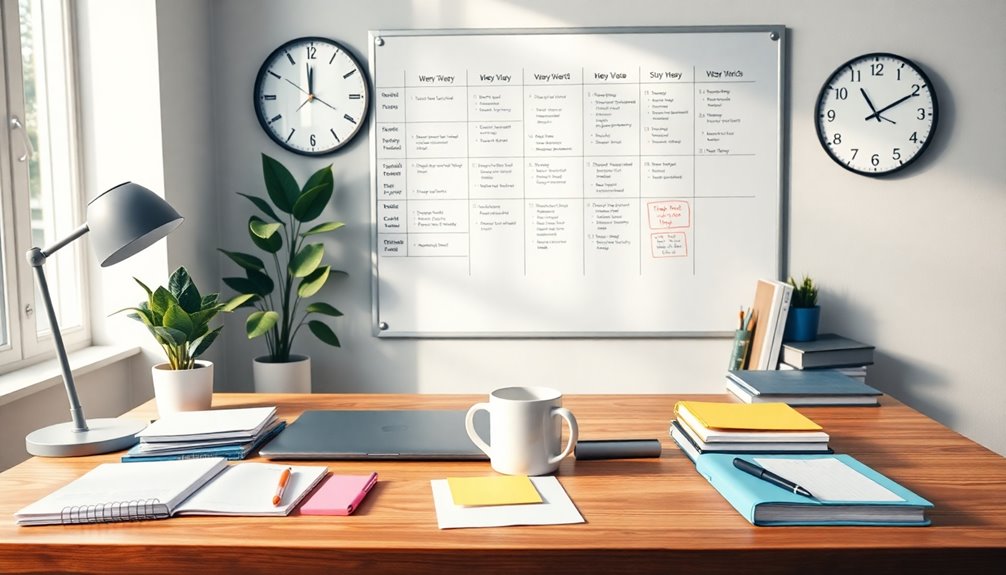To create a winning study plan, start by understanding your learning style and setting clear, specific goals. Break larger tasks into manageable steps with deadlines to stay focused. Use a calendar to block time for study sessions, ensuring you dedicate specific days to each subject. Adopt effective note-taking techniques that work for you, like the Cornell Method or mind mapping, to enhance comprehension. Regularly test your understanding through self-quizzing and create study guides. Stay flexible and adjust your plan as needed to keep it effective. There's so much more you can discover to refine your study strategy further.
Key Takeaways
- Analyze your current study habits to identify effective techniques and tailor your study plan accordingly.
- Set SMART goals by defining specific, measurable, achievable, relevant, and time-bound objectives to maintain focus.
- Develop a flexible study schedule that blocks out classes and incorporates available study times and breaks.
- Utilize diverse note-taking techniques, like outlining or mapping, to enhance understanding and retention of material.
- Regularly review and adjust your study plan to ensure it remains relevant and effective in meeting your learning goals.
Understanding Your Learning Style

How do you learn best? Understanding your learning style is crucial for effective studying.
If you're a visual learner, you thrive with graphs, charts, and color-coded notes. Use diagrams and concept maps to reinforce your understanding. Visual learners often benefit from structured study materials that highlight key concepts.
Auditory learners, on the other hand, excel when information is shared through lectures or discussions. Engage with podcasts and audiobooks to deepen your comprehension.
If you lean towards kinesthetic learning, hands-on activities and real-world applications are your best bet. Embrace experiments and practical exercises to grasp new concepts.
Finally, if you identify as a multimodal learner, mix methods for a tailored approach. Combining styles, like audio and kinesthetic, can enhance your learning experience and help you retain information more effectively.
Setting Clear Goals

Setting clear goals is essential for busy students who want to maximize their study effectiveness. First, define specific objectives that outline what you need to accomplish, like "Complete Modules 1 and 2." Additionally, setting goals should involve utilizing SMART goals to enhance clarity and focus.
Break larger goals into smaller, manageable tasks to keep your focus sharp. Ensure your goals align with course requirements and display them prominently to track your progress. Additionally, remember to celebrate achievements as you meet your goals, which helps maintain motivation.
Establish measurable criteria to know when you've succeeded, such as completing a specific number of chapters. Set realistic expectations and assess your resources to make sure your goals are achievable.
Finally, give each goal a deadline to create urgency, and adjust these deadlines as necessary to keep everything relevant and on track.
Developing a Study Schedule

With clear goals in place, the next step is to develop a study schedule that fits your busy life. Start by analyzing your current study habits. Identify what works and what doesn't, and determine if you prefer long blocks or shorter sessions.
Use a digital or paper calendar to block out your classes, work, and extracurriculars, pinpointing available study times. Calculate the study hours needed for each class based on the syllabus, and designate specific days for each subject. Study plans can serve as organized schedules that enhance your time management and organization. Additionally, incorporating educational toys into your breaks can help rejuvenate your mind and improve focus when you return to studying.
Be flexible—consider using commute time for studying. Remember to take breaks to recharge, and treat your study sessions like important appointments. Regularly review and adjust your schedule to ensure you're meeting your goals without feeling overwhelmed.
Effective Note-Taking Techniques

Effective note-taking techniques can significantly enhance your learning experience, especially when you're juggling a busy schedule.
Try the mapping method if you're a visual learner; it organizes concepts around a central topic, making relationships clear.
For detailed subjects, the outlining method structures information using headings and bullet points, which helps you see the hierarchy.
The Cornell method promotes active learning by dividing your notes into cues, main ideas, and summaries, perfect for quick reviews. Active listening during lectures can also improve how well you absorb information.
If you're in fast-paced classes, the sentence method lets you jot down key points quickly.
Whichever method you choose, ensure you use tools like colors or symbols to make your notes visually appealing and easier to understand.
Optimizing Study Locations

Finding the right study location can make a significant difference in your productivity and focus. Choose spaces with controllable noise levels and minimal distractions. Steer clear of high-traffic areas like kitchens or entryways, and pick spots with enough room to spread out your materials. Natural light from windows can enhance your concentration and mood, so consider that when selecting your space. Identify environments that suit your productivity needs, whether that's a coffee shop or a quiet study lounge. Experiment with different locations to keep your focus sharp.
Incorporating active engagement in your study sessions can also improve retention and understanding. Eliminate distractions by silencing your phone and keeping your area clutter-free. Lastly, don't forget to evaluate comfort and ergonomics to prevent physical discomfort during your study sessions.
Testing Understanding

After establishing a productive study environment, it's time to focus on how to ensure you've truly grasped the material. Start by actively questioning yourself—formulate questions and create practice tests in various formats.
When self-testing, say the answers aloud to reinforce retention and uncover gaps in your understanding. Relate concepts to your personal experiences and use analogies to simplify complex ideas. Implementing techniques used in software quality assurance can help you develop a systematic approach to verifying your knowledge.
Organize your material with study guides, flashcards, and diagrams, breaking it into manageable chunks. Engage in active learning by explaining the material in your own words, participating in discussions, and using methods like SQ3R for reading. Incorporating brief study blocks into your routine can lead to better retention over time.
Regularly review troublesome concepts to strengthen your grasp and build confidence for upcoming tests.
Adjusting Strategies for Success

While you may have established a solid study routine, adjusting your strategies can significantly enhance your academic success.
Start by analyzing your current study habits to see what's effective. Determine if you thrive in long sessions or shorter daily bursts, and identify your peak productivity times. Don't hesitate to experiment with different study methods, too.
Next, manage your time effectively. Use a daily schedule template to block out commitments and make study sessions non-negotiable. Effective time management can lead to improved academic performance and foster a sense of control over your personal and academic life.
Also, explore various study environments to maintain focus—coffee shops can be great!
Finally, set SMART goals and evaluate them weekly. Break larger objectives into manageable tasks and monitor your progress.
Adjust your goals as necessary to stay motivated and on track throughout the term.
Frequently Asked Questions
How Do I Stay Motivated During Long Study Sessions?
To stay motivated during long study sessions, break your tasks into smaller, manageable goals.
Use techniques like the Pomodoro method—study for 25 minutes, then take a 5-minute break.
Mix up your study methods, and create a distraction-free environment that keeps you focused.
Celebrate each accomplishment to boost your motivation, and don't hesitate to change locations if you feel your energy waning.
What Are Some Effective Stress Management Techniques for Students?
To manage stress effectively, focus on a few key techniques.
Get enough sleep and eat nutritious meals to fuel your body. Incorporate regular exercise into your routine to boost motivation.
Practice mindfulness and meditation to enhance your focus and calm your mind.
Don't forget to build a support network; talking to friends or family can help.
Lastly, take breaks and engage in fun activities to maintain balance and reduce pressure.
How Can I Balance Studying With Extracurricular Activities?
Balancing studying with extracurricular activities can feel challenging, but it's doable!
Start by creating a schedule that includes both your study sessions and activity commitments. Prioritize your tasks, focusing on what's urgent and important.
Use techniques like the Pomodoro Technique to maximize your study efficiency. Remember to allocate time for self-care and breaks, too—this keeps you refreshed and motivated.
Stay flexible and adjust your plans as needed to maintain that balance.
What Role Does Nutrition Play in Effective Studying?
Nutrition plays a crucial role in effective studying. When you maintain a balanced diet, rich in complex carbohydrates, healthy fats, and proteins, you sustain your energy levels and enhance mental alertness.
Skipping meals, especially breakfast, can leave you feeling drained and unfocused. Nutrients like omega-3s, vitamins, and antioxidants improve concentration and memory.
Staying properly hydrated also supports cognitive function, helping you absorb and retain information more efficiently during your study sessions.
How Can I Improve My Focus While Studying?
To improve your focus while studying, start by creating an organized and comfortable study space.
Minimize distractions by using apps to block social media and putting your phone on airplane mode.
Try the Pomodoro Technique—study for 25 minutes, then take a 5-minute break.
Incorporate deep breathing exercises or mindfulness to enhance concentration.
Lastly, set realistic goals, and reward yourself for achieving them to maintain motivation and keep your focus sharp.
Conclusion
By understanding your learning style, setting clear goals, and developing a study schedule, you can create a winning study plan that fits your busy life. Incorporate effective note-taking techniques and optimize your study locations to enhance focus. Regularly test your understanding to gauge progress, and don't hesitate to adjust your strategies as needed. With these tools, you'll not only manage your time better but also boost your confidence and academic success. You've got this!









